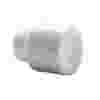- High strength and rigidity
- Good impact resistance
- Low water absorption rate and hydrolysis resistant
- Excellent dimensional stability
- Low tendency to creep
- Great chemical resistance to bleach, alcohols, salts
- Good thermal stability with high melting point
- Effective electrical insulator
- Weather resistant
- Some grades flame resistant
- Easily molded and versatile
PBT PLASTIC MATERIAL & MACHINING
DIMENSIONALLY STABLE MATERIAL WITH GOOD FRICTION & WEAR PROPERTIES
Most know polybutylene terephthalate (PBT) as a strong, rigid, and stable resin popular in the food industry as well as in electrical and research applications. This type of polyester derives itself from the polymerization process between butanediol and terephthalic acid that results in a linear molecular structure with repeating ester linkages.
Exhibiting an excellent combination of mechanical, electrical, and thermal properties, PBT stands as one tough resin that can outlast other materials that might otherwise degrade under such intense operation.
Watch the video below, and get to know PBT in under 1.5 minutes.
REACH OUT TO US
.jpg?format=pjpeg&width=100&quality=10)
